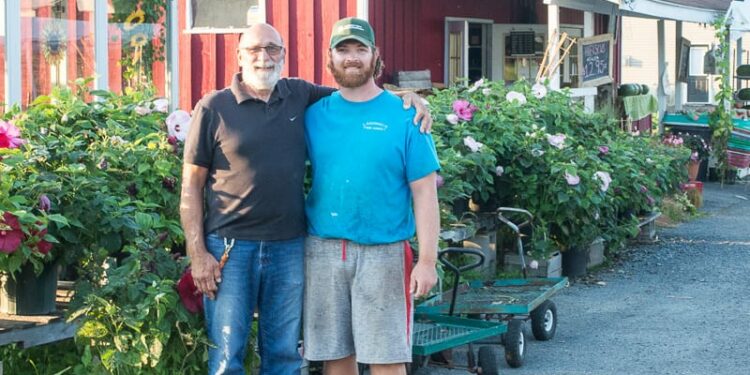COLONIE — The Lansings have grown fresh fruit and vegetables on Lisha Kill Road for 233 years. And now, the plan to keep it that way forever is done.
It took nearly two years to raise $130,500 to match by 25 percent a $389,710 state Department of Agriculture and Markets grant awarded in 2018. The money was raised by the Mohawk Hudson Land Conservancy, which also helped secure the state grant, Equity Trust, a Massachusetts nonprofit that works to preserve working farms, Scenic Hudson Land Trust and the Friends of Lansing Farm, a group of interested neighbors and supporters.
In its heyday, the farm was 1,000 acres. Over the years, chunks of land were sold off and new houses grew where fruits and vegetables once did. Al Lansing has operated the farm since 1964, and over the years has proved a more and more difficult way to sustain a family. He has been tempted by attractive offers to sell off the last 20 acres, but when his son Patrick moved back home and wanted to take over the farm, he began exploring ways to keep it going.
 “After a long campaign, I am very excited to see this farm preservation project come to fruition. Many people had said the state was only concerned about larger tracts of land north and west of Colonie and that this project was unlikely to happen. We are very fortunate that the value of these glacial soils and the quality of the fruits and vegetables they produce were recognized during our application review,” Al Lansing said. “My family has been farming these soils since 1788 — it is more than just a way to make a living; it is our way of life. Now, these soils can continue to produce food for many more generations.”
“After a long campaign, I am very excited to see this farm preservation project come to fruition. Many people had said the state was only concerned about larger tracts of land north and west of Colonie and that this project was unlikely to happen. We are very fortunate that the value of these glacial soils and the quality of the fruits and vegetables they produce were recognized during our application review,” Al Lansing said. “My family has been farming these soils since 1788 — it is more than just a way to make a living; it is our way of life. Now, these soils can continue to produce food for many more generations.”
The farm nearly shuttered when Al Lansing essentially took it over at the tender age of 14. Keeping the farm going hasn’t been easy, he said during a previous interview, but he made it work through hard work, some ingenuity and changing with the times.
The farm now has greenhouses, sells seedlings and fresh baked goods and has more than 100 community supported agriculture members, which is similar to a co-op where people pay a flat fee to get a certain amount of fresh fruits and vegetables each week. It also hosts a growing farm to table dinner each Saturday night in a glass enclosed room at the farm.
In addition to protecting the land from development, the conservation easement includes a “preemptive purchase right,” a provision that will enable MHLC to ensure that the land will always remain productive farmland and only be sold to working farmers at its agricultural value. In other words, if Patrick Lansing wants to sell sometime in the future, he can only sell it to another farmer who must work the land as a farm.
“Keeping farmland affordable for farmers is essential to their ability to continue to grow food for their communities, and we’re delighted to have achieved just that for this important piece of farmland,” said Equity Trust Executive Director Jim Oldham.
Lansing Farm was ranked a priority for protection in Scenic Hudson’s Foodshed Conservation Plan, a data-driven blueprint for ramping up collaborative farmland-protection efforts to create a secure source of fresh, local food for the Hudson Valley and New York City. Its contribution to the project came from the organization’s Lila Acheson and DeWitt Wallace Hudson Valley Land Preservation Endowment.
“This land connects so many people in the Capital Region to fresh food as well as to the Hudson Valley’s agricultural heritage,” said Steve Rosenberg, executive director of The Scenic Hudson Land Trust, Inc. “The fact that neighbors on the Friends of Lansing Farm supported its protection attests to the farm’s importance to the community. Scenic Hudson thanks them, along with the Mohawk Hudson Land Conservancy, Equity Trust, the state Department of Agriculture & Markets and above all the Lansings for partnering with us to ensure it will pass to the family’s ninth generation.”
Patrick Lansing went to college to study biology and spent some time behind a desk working in Boston. He gave up that life and is not poised to take over the farm.
“When you sit behind a desk you feel like you are wasting away so I wanted to come back here. It keeps me active and it’s an enjoyable job. You control your own hours and there is nobody telling you what do to,” he said in 2018. “And I wanted to continue the family legacy. We have been here a long time.”



